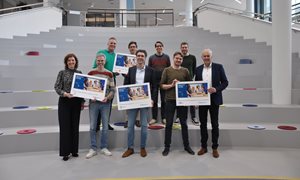
What do you get if you combine top-medical research with an impact on health and healthcare and cutting-edge technological research that empowers society through sustainable solutions? In a long-standing collaboration, Radboud university medical center (Radboudumc) and the University of Twente (UT) combine their expertise to cater for unmet medical needs and technological advances. Each year, four projects with a researchers from Radboudumc and UT receive funding to explore a new collaboration and do the necessary experiments to file a larger joint grant proposal. Curious for these innovative research projects that are on their way to the market?
Mini kidneys on a chip
Project title: Micro-RENALization: Realization of a 3D tubular kidney-on-a-chip platform mimicking renal micro-physiology
Liliana Moreira Teixeira (UT) & Tom Nijenhuis (Radboudumc)
Kidneys are complex organs in the human body that are responsible for filtering the blood. The ‘filter unit’, the glomerulus, produces about 180 liter pre-urine per day, which is concentrated by the tubule system to 1-2 liter per day. To study kidney diseases, scientists currently rely on two separate systems: cell cultures in flat layers of the glomerulus and 3D cell models of tubules in hollow fibers. The researchers from Radboudumc and UT set out to develop a 3D model for the glomerulus, which is able to connect with the 3D model of tubules. By growing the combination of cells on specific tube-like matrices, the system will mimic the natural state of the cells in the glomerulus, including different pressure and other conditions to the different sides of the cells. Radboudumc’s expertise of kidneys and existing cellular models will be combined with Twente’s knowledge on cellular matrices and chips.
How too much exercise may hurt your heart
Project title: MICRO-ATHLETE: Human-engineered cardiomyocyte tissues to unravel the deleterious effects of exercise on the heart
Robert Passier (UT) & Thijs Eijsvogels (Radboudumc)
High-volume, high-intensity exercise can harm the heart through myocardial injury and induction of scar formation. In many individuals cardiac troponin levels increase after exercise and too high increases may be associated with cardiac damage and compromised health. However, at present there is very little understanding with respect to the underlying cellular mechanisms of troponin release. Passier en Eijsvogels set out to establish a human heart tissue based platform to simulate and investigate exercise induced effects on heart tissue. As the project uses patient derived pluripotent stem cells for generation of cardiomyocytes, the platform can also capture patient-specific differences. A strong point of this project is that it does not only establish highly innovative technology but will – within the project – address cardiac physiology, thus take the platform to application.
Sorting the special: how the malaria parasite interacts with the human liver
Project title: The Liver-Stage of Malaria: Investigating liver cell infection on a chip to test/develop interventions that prevent disease and spread of malaria parasites
Ruchi Bansal (UT) & Benjamin Mordmueller (Radboudumc)
Malaria is one of the deadliest infectious diseases worldwide and is caused by the parasite Plasmodium falciparum. Within its complex life cycle, the stage of the parasite in the human liver presents a bottleneck and a good entry for intervention. However, liver infection is difficult to investigate and model because under natural conditions less than 100 cells are infected per subject and infection efficiencies in advanced cell cultures are less than 1 %. This project combines two technological innovations: liver-on-a-chip models and cell sorting from Twente and human malaria research and parasite production from Nijmegen. By joining these expertise, the researchers can study the interaction of the parasite with the liver cells on a single-cell level. With this, they aim to shed light on the biological processes in the liver stage and how these can be affected to prevent malaria and the spread of malaria parasites.
Testing new technology in the operating theatre
Project title: Real-time non-invasive perfusion imaging of the skin – accurate tissue assessment in the blink of an eye
Wiendelt Steenbergen (UT) & Stefan Hummelink (Radboudumc)
Wound healing in plastic surgery is dependent on the blood supply to the operated region (perfusion). This particularly important in recovery from burn wounds, lesions resulting from psoriasis and surgeries with a resulting ‘flap’, such as breast reconstructions. Researchers from Twente already developed a handheld imaging device that is able to monitor perfusion real-time. In this project, the researchers combine forces to optimize the prototype of the handheld device to be used in the operating theatre or on the bedside, thereby facilitating well-informed decisions about treatment. This would lead to better outcomes of the surgeries and less need to re-operate. This project has the potential to really bring technology closer to the clinic.
TURBO program
These grants are awarded as part of the TURBO program, where TURBO means ‘Twente University RadBoudumc Opportunities’, which started in 2017. Within this program, research groups from the University of Twente (TechMed Centre) and Radboud university medical center receive a grant of €80,000 to work on an innovative idea that will lead to a grant application from an external sponsor, such as national or European funds and companies within the field of health(care).




